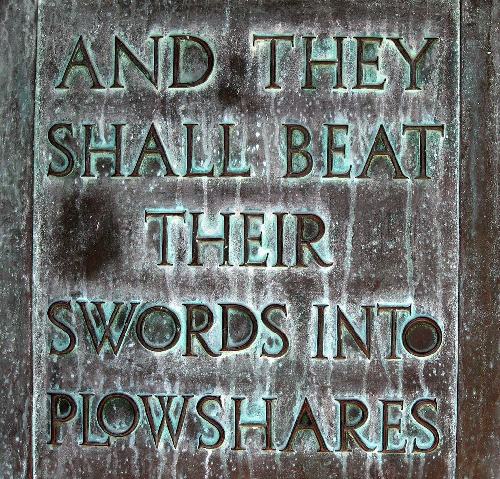
'They shall beat their swords into plowshares - NCSU Belltower Door'
(Image by Skakerman (Archive)) Details DMCA
Recovering Conscience: An Conversation with Carole Sargent
by John Kendall Hawkins
Carole Sargent, PhD, is an associate of the Sacred Heart and founding faculty director of Georgetown University's Office of Scholarly Publications. She helped RSCJ sisters establish Anne Montgomery House in Washington, DC, where Megan Rice, SHCJ, was a neighbor and friend. With Drew Christiansen, SJ, she coedited A World Free from Nuclear Weapons: The Vatican Conference on Disarmament (Georgetown University Press, 2020), and she has published previous books with Farrar, Straus & Giroux. She writes from the contemplative scholars' house she founded (www.publishingadvising.com/house).
The following edited Zoom conversation took place on December 27, 2021.
John Hawkins: I read your article recently, "Nuns Against Nuclear Weapons: Plowshares Protesters have Fought for Disarmament for Over 40 Years, Going to Prison for Peace." It brought back memories of my Catholic youth in and around Boston in the '60s when Jesuits were turning activist and priests were getting excommunicated for leading public protests of outrageous government policies of day, especially against the Vietnam War, as well as opening up so-called concept halfway houses and drop-in centers for drug addicts.
But more recently I've been considering what Noam Chomsky has said, that there are three crises we need to be collectively concerned about moving forward: Climate Change, Nuclear War, and the global decline of Democracy. These are all existential issues we can all get around together.
So, let's go there. Do you agree with Noam? Would those be your three?
Carole Sargent: I agree with those three. I live in Washington, D.C., I was born here and I grew up here. And so you learn to have bipartisan conversations about what's important. Like, people keep wanting to argue over transgender. And I said, what if we set that question aside for right now and we talked about genocide? You know, if we set aside some of these issues that we're never going to agree on and focus on the things that almost anybody can agree with - you know, that torture shouldn't be? But why don't we set these aside? So when you tell me what Chomsky said, yeah, that sounds right to me, and I don't always agree with Noam Chomsky, but I can agree with him on those three things.
JH: Yeah, so I think what Chomsky is trying to do is get around all the noise that's out there and get us focused on issues we must do something about to ensure a future for people and how we relate to power. In the '60s we had the war to rally around, you know, and that sort of brought up economic and racial issues that needed tackling, too. But now it's like all of this noise all over the place and the internet sort of feeds the distancing, and instead of bringing us together the social media instead amplifies the incoherence in some ways. Sometimes I wish a solar flare would come along and take out the grids for a couple of years, just so we could go back to face-to-face meetings.
So, I read your article about nuns putting their dukes up against nukes. You know, I think that's a great idea. Just reminded me of my childhood. Some of the best people I've ever met were Catholic activists -- people who were willing to let go of their 'calling' to become activists and stop evil things from happening. That's what you write about, isn't it, in your upcoming book, Transform Now Plowshares. The description blurb reads:
In July 2012, a Holy Child sister and two Catholic Workers committed the largest breach in US nuclear security history. They entered an enriched uranium facility armed with candles, bread, Bibles, and roses, to pray and paint peace slogans. As Transform Now Plowshares, they hoped to put nuclear weapons--which target civilians in violation of the Geneva Conventions and UN treaties--on trial, making international news.
Is that the gist?
CS: Yes, Megan Rice. In this instance, they're lending moral authority to the conversation. They tend to get more press than the secular people. And some of it has annoyed some folks, but it just tends to happen now. The event also included two men: Gregory Boertje-Obed and Michael Walli. We don't call it a 'break in'. We think they just entered. They really didn't have to break in. They snipped one fence on the perimeter, but the cameras were out and the sensors had been turned off and they walked right in right.
(Note: You can view every article as one long page if you sign up as an Advocate Member, or higher).




